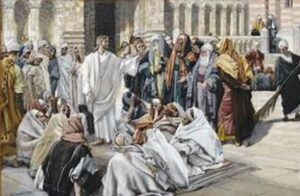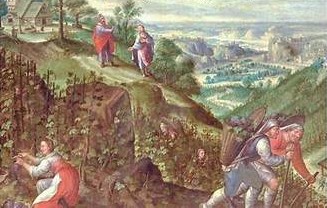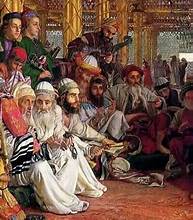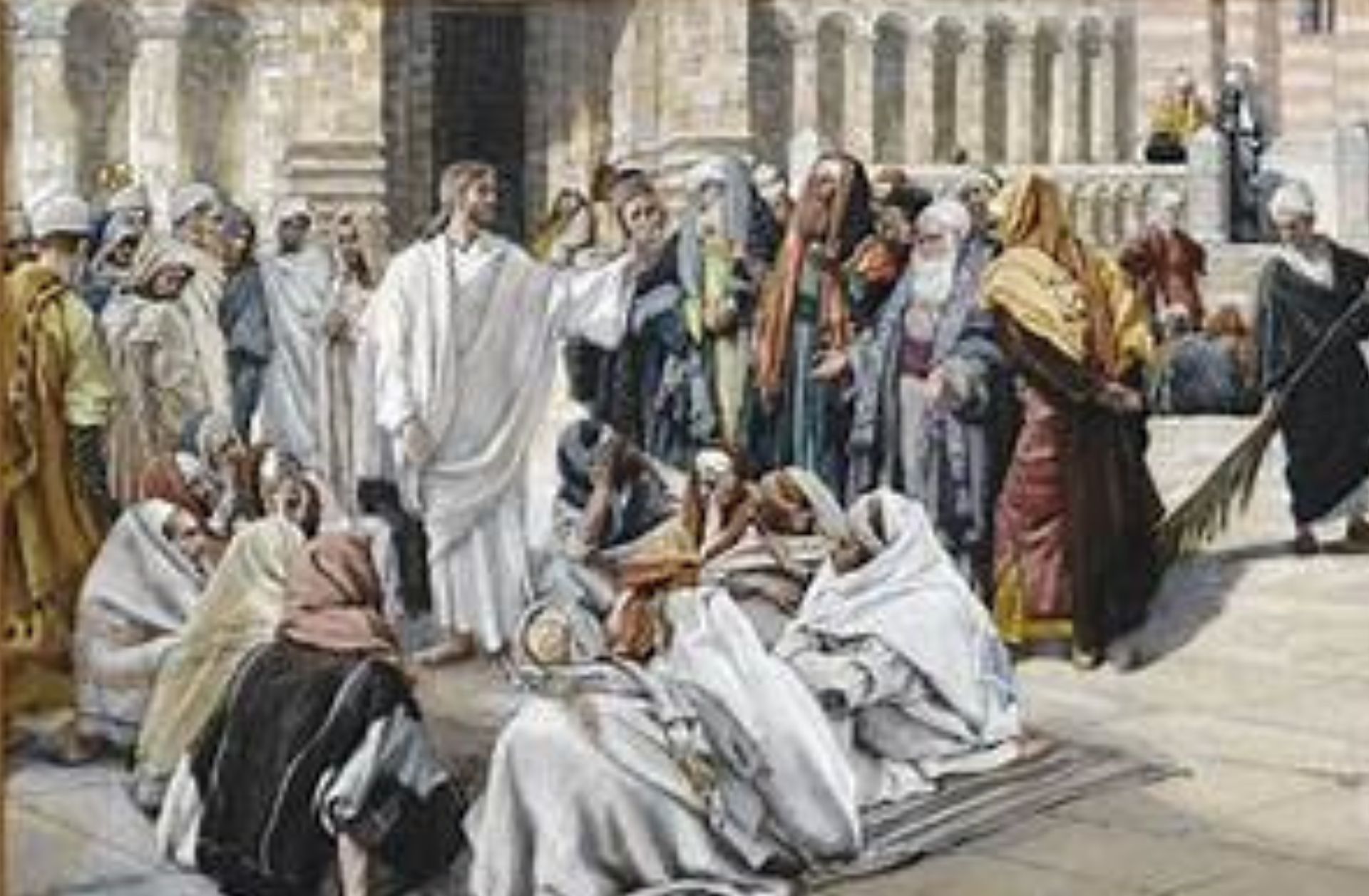Luke 20:1-47 King James Bible KJV

Jesus’ Authority Questioned, the Parable of the Wicked Tenants, Taxes to Caesar, The Sadducees and the Resurrection, Warning Against the Scribes
Luke 20:1-47 King James Bible KJV. Luke Chapter 20 contains several important teachings and confrontations between Jesus and the religious leaders in Jerusalem. The chapter deals with themes such as Jesus’ authority as the Messiah, the failures of the religious leaders, the nature of God’s kingdom, and the responsibility of religious leadership. Jesus exposes the false piety of the religious elite, teaches about the resurrection, and affirms His divine mission.
- Jesus’ Authority: Throughout the chapter, Jesus’ authority is challenged, but He consistently asserts His divine authority, particularly in His parable and teaching about the resurrection and the Messiah.
- Judgment on the Religious Leaders: The chapter is filled with confrontations between Jesus and the religious leaders, where He exposes their hypocrisy and failure to lead the people faithfully.
- The Kingdom of God: Jesus teaches that the kingdom of God operates on different principles than earthly kingdoms. In God’s kingdom, true authority, righteousness, and faithfulness are what matter.
- The Nature of the Messiah: Jesus reveals that the Messiah is not just a political or earthly king but a divine figure with authority over all creation. He fulfills both the role of the Davidic king and the suffering servant.
- Faithfulness and Judgment: The parable of the wicked tenants and the warning against the scribes show that those entrusted with leadership in God’s kingdom are accountable for their actions. Failure to fulfill their responsibilities leads to judgment.
Luke 20:1-47 King James Bible KJV
—————-
The Authority of Jesus Questioned – verses 1–8
The chapter begins with the chief priests, scribes, and elders questioning Jesus’ authority as He teaches in the temple. They ask Him, “By what authority are you doing these things?” In response, Jesus asks them a question about John the Baptist: “Was the baptism of John from heaven or from men?” The religious leaders hesitate to answer because if they say “from heaven,” Jesus would ask why they didn’t believe John. But if they say “from men,” they fear the people, who regard John as a prophet. Unable to answer, they say, “We don’t know.” Jesus then declines to tell them by what authority He acts.
- Jesus’ Divine Authority: The religious leaders are trying to trap Jesus, but He skillfully turns the question back on them. His refusal to answer directly shows that His authority comes from God, not from human institutions.
- The Leaders’ Hypocrisy: Their inability to answer Jesus’ question shows their unwillingness to acknowledge the truth about John the Baptist and, by extension, Jesus. They are more concerned about maintaining their power and avoiding conflict than seeking the truth.

The Parable of the Wicked Tenants – verses 9–18
Jesus tells a parable about a man who plants a vineyard and rents it out to tenants. When the time comes to collect the fruit, the owner sends servants to the tenants, but the tenants beat and mistreat them. Finally, the owner sends his beloved son, thinking they will respect him, but the tenants kill the son, hoping to take the inheritance for themselves. Jesus asks what the owner will do. He answers that the owner will destroy the wicked tenants and give the vineyard to others. The religious leaders realize that the parable is directed at them, and they are angered.
Jesus concludes with a reference to Psalm 118:22, saying, “The stone that the builders rejected has become the cornerstone,” and warns that anyone who falls on this stone will be broken, but it will crush anyone on whom it falls.
- The Vineyard Represents Israel: The vineyard in the parable symbolizes Israel, and the tenants represent the religious leaders who have been entrusted with the care of God’s people. The servants sent by the owner represent the prophets, and the son represents Jesus.
- Judgment on the Leaders: The parable is a condemnation of the religious leaders’ failure to lead Israel faithfully. By rejecting the son (Jesus), they seal their own judgment. The owner’s decision to give the vineyard to others signifies that the kingdom of God will be taken from them and given to those who bear its fruits.
- Jesus as the Cornerstone: The reference to the rejected cornerstone points to Jesus as the foundation of God’s new covenant. Though rejected by the leaders, He will become the cornerstone of God’s redemptive plan.

Paying Taxes to Caesar – verses 19–26
The religious leaders send spies to trap Jesus by asking whether it is lawful to pay taxes to Caesar. If Jesus says yes, He risks losing favor with the people who resent Roman occupation. If He says no, He risks being accused of rebellion against Rome. Jesus, perceiving their trickery, asks for a denarius and inquires whose image is on the coin. They answer, “Caesar’s.” Jesus then says, “Give to Caesar what is Caesar’s, and to God what is God’s.” His answer amazes them, and they are unable to trap Him.
- Wisdom of Jesus: Jesus’ response shows His wisdom in avoiding the trap set by the religious leaders. He acknowledges the reality of political authority (represented by Caesar) but points to a higher spiritual authority (God).
- Dual Responsibility: Jesus teaches that while believers have obligations to earthly authorities (such as paying taxes), their ultimate allegiance is to God. “Give to God what is God’s” refers to giving one’s life, heart, and worship to God, as humans are made in His image.
- Kingdom Priorities: The incident highlights the distinction between earthly kingdoms and the kingdom of God. While Caesar’s authority is temporary, God’s authority is eternal.


The Sadducees and the Resurrection – verses 27–40
The Sadducees, who deny the resurrection, present Jesus with a hypothetical scenario about a woman who marries seven brothers in succession (according to the levirate marriage law) but has no children with any of them. They ask, “At the resurrection, whose wife will she be?” Jesus responds by explaining that in the resurrection, people will neither marry nor be given in marriage; they will be like the angels. He then affirms the resurrection by pointing to Moses’ encounter with God in the burning bush, where God identifies Himself as the God of Abraham, Isaac, and Jacob—who are alive to God.
- Resurrection Life: Jesus teaches that life in the resurrection will be fundamentally different from earthly life. The relationships and institutions that define human life, such as marriage, will not operate in the same way in the new, eternal life.
- God of the Living: Jesus’ argument that God is the God of the living (not the dead) affirms the reality of the resurrection. The patriarchs (Abraham, Isaac, and Jacob) continue to live in relationship with God, even after their earthly deaths.
- Correcting False Beliefs: Jesus corrects the Sadducees’ misunderstanding of the resurrection and exposes their limited view of God’s power and promises.

Whose Son is the Christ? – verses 41–44
Jesus challenges the religious leaders with a question: “How can the Messiah be David’s son when David himself calls Him ‘Lord’?” He quotes Psalm 110:1, where David says, “The Lord said to my Lord, ‘Sit at my right hand until I make your enemies a footstool for your feet.’” Jesus implies that the Messiah is greater than David and not merely his descendant.
- Jesus’ Identity as Messiah: Jesus is highlighting that the Messiah (Christ) is not just a descendant of David but is divine, as David himself calls the Messiah “Lord.” This points to Jesus’ own identity as both the promised Messiah and the Son of God.
- The Divine Messiah: By asking this question, Jesus is emphasizing that the religious leaders have a limited understanding of the Messiah. He is not only a political ruler but also a divine figure who will reign at God’s right hand.


Warning Against the Scribes – verses 45–47
Jesus concludes the chapter by warning His disciples about the scribes. He criticizes them for their hypocrisy, pride, and exploitation of the vulnerable. The scribes love to be honored in public and take advantage of widows, all while making long, pretentious prayers. Jesus warns that they will receive greater condemnation.
- Condemnation of Hypocrisy: Jesus exposes the hypocrisy of the religious leaders who seek public recognition and honor while neglecting justice and exploiting the weak. This is a warning against religious hypocrisy, where outward appearances mask inner corruption.
- Judgment for False Piety: Jesus makes it clear that religious leaders who abuse their positions and exploit others for personal gain will face severe judgment. True righteousness involves humility and care for the vulnerable.
Luke 20:1-47 King James Bible KJV
1 And it came to pass, that on one of those days, as he taught the people in the temple, and preached the gospel, the chief priests and the scribes came upon him with the elders,
2 And spake unto him, saying, Tell us, by what authority doest thou these things? or who is he that gave thee this authority?
3 And he answered and said unto them, I will also ask you one thing; and answer me:
4 The baptism of John, was it from heaven, or of men?
5 And they reasoned with themselves, saying, If we shall say, From heaven; he will say, Why then believed ye him not?
6 But and if we say, Of men; all the people will stone us: for they be persuaded that John was a prophet.
7 And they answered, that they could not tell whence it was.
8 And Jesus said unto them, Neither tell I you by what authority I do these things.

9 Then began he to speak to the people this parable; A certain man planted a vineyard, and let it forth to husbandmen, and went into a far country for a long time.
10 And at the season he sent a servant to the husbandmen, that they should give him of the fruit of the vineyard: but the husbandmen beat him, and sent him away empty.
11 And again he sent another servant: and they beat him also, and entreated him shamefully, and sent him away empty.
12 And again he sent a third: and they wounded him also, and cast him out.
13 Then said the lord of the vineyard, What shall I do? I will send my beloved son: it may be they will reverence him when they see him.
14 But when the husbandmen saw him, they reasoned among themselves, saying, This is the heir: come, let us kill him, that the inheritance may be ours.
15 So they cast him out of the vineyard, and killed him. What therefore shall the lord of the vineyard do unto them?
16 He shall come and destroy these husbandmen, and shall give the vineyard to others. And when they heard it, they said, God forbid.
17 And he beheld them, and said, What is this then that is written, The stone which the builders rejected, the same is become the head of the corner?
18 Whosoever shall fall upon that stone shall be broken; but on whomsoever it shall fall, it will grind him to powder.

19 And the chief priests and the scribes the same hour sought to lay hands on him; and they feared the people: for they perceived that he had spoken this parable against them.
20 And they watched him, and sent forth spies, which should feign themselves just men, that they might take hold of his words, that so they might deliver him unto the power and authority of the governor.
21 And they asked him, saying, Master, we know that thou sayest and teachest rightly, neither acceptest thou the person of any, but teachest the way of God truly:
22 Is it lawful for us to give tribute unto Caesar, or no?
23 But he perceived their craftiness, and said unto them, Why tempt ye me?
24 Shew me a penny. Whose image and superscription hath it? They answered and said, Caesar’s. 25 And he said unto them, Render therefore unto Caesar the things which be Caesar’s, and unto God the things which be God’s.
26 And they could not take hold of his words before the people: and they marvelled at his answer, and held their peace.

27 Then came to him certain of the Sadducees, which deny that there is any resurrection; and they asked him,
28 Saying, Master, Moses wrote unto us, If any man’s brother die, having a wife, and he die without children, that his brother should take his wife, and raise up seed unto his brother.
29 There were therefore seven brethren: and the first took a wife, and died without children.
30 And the second took her to wife, and he died childless.
31 And the third took her; and in like manner the seven also: and they left no children, and died.
32 Last of all the woman died also.
33 Therefore in the resurrection whose wife of them
is she? for seven had her to wife.
34 And Jesus answering said unto them, The children of this world marry, and are given in marriage:
35 But they which shall be accounted worthy to obtain that world, and the resurrection from the dead, neither marry, nor are given in marriage:
36 Neither can they die any more: for they are equal unto the angels; and are the children of God, being the children of the resurrection.
37 Now that the dead are raised, even Moses shewed at the bush, when he calleth the Lord the God of Abraham, and the God of Isaac, and the God of Jacob.
38 For he is not a God of the dead, but of the living: for all live unto him.
39 Then certain of the scribes answering said, Master, thou hast well said.
40 And after that they durst not ask him any question at all.

41 And he said unto them, How say they that Christ is David’s son?
42 And David himself saith in the book of Psalms, The LORD said unto my Lord, Sit thou on my right hand,
43 Till I make thine enemies thy footstool.
44 David therefore calleth him Lord, how is he then his son?

45 Then in the audience of all the people he said unto his disciples,
46 Beware of the scribes, which desire to walk in long robes, and love greetings in the markets, and the highest seats in the synagogues, and the chief rooms at feasts;
47 Which devour widows’ houses, and for a shew make long prayers: the same shall receive greater damnation.
This is His Good Word as written in Luke 20:1-47 King James Bible. Click here to listen to the audio recording of Luke 20:1-47 or click this link to continue on to Chapter 21 of The Gospel of Luke. Peace be with you 🙏
You must be logged in to post a comment.